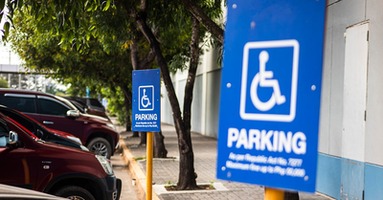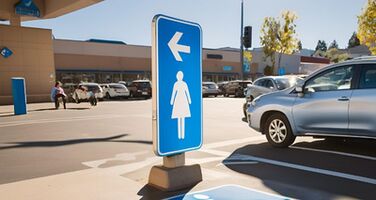
Get a Disabled Parking Permit for Placenta Previa
Introduction
Get a Disabled Parking Permit for Placenta Previa - Placenta previa is a significant pregnancy complication that can drastically affect a woman's mobility and daily activities. For those who suffer from this condition, even routine tasks such as walking or standing for extended periods can become daunting. In such cases, a disabled parking permit can provide much-needed relief by allowing closer access to essential services and facilities. This article explores PP in depth, discusses why it impacts women so severely, outlines the treatment options, explains why this condition qualifies for a disabled parking permit, and details how HandicapMD.com can assist in obtaining one.
What is Placenta Previa?
PP is a condition in pregnancy where the placenta, the organ that provides oxygen and nutrients to the growing baby, is located unusually low in the uterus. In some cases, it can cover the cervix, the opening to the uterus, either partially or completely. This condition can lead to serious complications, particularly if not managed properly.
Types of Placenta Previa:
- Complete PP: The placenta completely covers the cervix.
- Partial PP: The placenta partially covers the cervix.
- Marginal PP: The placenta is located near the edge of the cervix.
- Low-Lying Placenta: The placenta is positioned low in the uterus but does not cover the cervix.
Causes and Risk Factors of Placenta Previa
PP can occur due to several reasons, though the exact cause is often unknown. However, certain factors can increase the risk of developing this condition:
- Previous Cesarean Sections: Women who have had previous C-sections are at a higher risk of PP.
- Multiple Pregnancies: The more pregnancies a woman has had, the higher the risk.
- Advanced Maternal Age: Women over 35 are at a greater risk.
- Smoking: Smoking during pregnancy is linked to an increased risk of PP.
- Multiple Gestations: Carrying more than one baby (twins, triplets, etc.) increases the likelihood of PP.
- History of PP: If a woman has had PP in a previous pregnancy, the risk of recurrence is higher.
Symptoms of Placenta Previa
The primary symptom of PP is painless, bright red vaginal bleeding during the second or third trimester. This bleeding can range from light spotting to heavy, life-threatening hemorrhages. Other symptoms may include:
- Preterm Labor: PP can trigger early contractions.
- Breech Position: The baby may be in a breech or transverse position due to the abnormal placement of the placenta.
- Fetal Growth Restriction: The placenta’s low position can sometimes limit the baby’s growth.
How is Placenta Previa Diagnosed?
PP is typically diagnosed through an ultrasound examination, which may be performed during a routine prenatal checkup. If PP is suspected, a transvaginal ultrasound may be recommended to provide a clearer view of the placenta's position. In some cases, magnetic resonance imaging (MRI) may be used to further assess the condition.
Treatment for PP
The treatment for PP depends on several factors, including the severity of the condition, the amount of bleeding, the stage of pregnancy, and the overall health of the mother and baby. Treatment options include:
Monitoring and Bed Rest: If the bleeding is mild, the patient may be advised to rest and avoid activities that could trigger bleeding, such as intercourse or heavy lifting. Bed rest may be recommended to reduce the risk of further bleeding.
Hospitalization: In cases of significant bleeding, hospitalization may be necessary for close monitoring. This allows for immediate medical intervention if complications arise.
Corticosteroids: If preterm birth is likely, corticosteroids may be administered to help mature the baby’s lungs and prepare for an early delivery.
Cesarean Section (C-Section): If the PP persists into the later stages of pregnancy, a planned C-section may be necessary. In most cases, a C-section is recommended around 36-37 weeks to avoid the risks associated with labor and vaginal delivery.
Emergency Delivery: If the bleeding is severe and threatens the life of the mother or baby, an emergency C-section may be performed, regardless of the gestational age.
The Impact of PP on Women
PP can have a profound impact on a woman’s physical and emotional well-being. The condition not only complicates the pregnancy but also imposes significant restrictions on daily life. Here’s how PP affects women:
Restricted Mobility: Women with PP are often advised to limit physical activity, which can severely restrict mobility. Even walking short distances can increase the risk of bleeding, making it difficult to perform everyday tasks.
Psychological Stress: The constant fear of bleeding, the uncertainty of the pregnancy outcome, and the potential need for an early delivery can lead to significant psychological stress and anxiety.
Need for Frequent Medical Visits: PP often requires regular monitoring, which can mean frequent visits to the doctor or hospital. This can be exhausting, especially for women who need to manage other responsibilities.
Impact on Employment: Many women with PP may need to take early maternity leave or reduce their work hours, leading to financial strain and career disruptions.
Risk of Preterm Birth: The possibility of preterm birth adds to the emotional and physical burden, as it may require preparation for a premature baby and the potential need for neonatal care.
Why PP Qualifies for a Disabled Parking Permit
Given the significant mobility challenges and risks associated with PP, many women may qualify for a disability tag during their pregnancy. Here’s why PP can justify the need for such a permit:
Limited Mobility: As mentioned, PP often necessitates restricted physical activity to avoid triggering bleeding. A disability tag allows women to park closer to their destination, reducing the distance they need to walk and minimizing the risk of complications.
Frequent Medical Appointments: Women with PP often need regular monitoring and medical care, making frequent trips to the hospital or clinic necessary. A disability tag ensures convenient access to medical facilities.
Risk of Bleeding: The risk of sudden bleeding can make it dangerous for women with PP to walk long distances or navigate large parking lots. A disability tag provides peace of mind by allowing them to park in closer, safer spots.
Physical Strain: Carrying a baby while dealing with the complications of PP can be physically exhausting. A disability tag helps alleviate some of this strain by providing more accessible parking options.
How to Get a Disabled Parking Permit for Placenta Previa
Obtaining a disability tag for PP involves a few key steps:
Consult with Your Healthcare Provider: The first step is to discuss your condition with your healthcare provider. They can assess your situation and determine whether a disability tag is medically necessary.
Obtain Medical Certification: If your healthcare provider agrees that a disability tag is warranted, they will need to provide a medical certification that outlines your condition and the need for the permit. This certification is a critical part of the application process.
Complete the Application: Most states require you to complete an application form for a disability tag. This form, along with the medical certification, is typically submitted to the local Department of Motor Vehicles (DMV) or equivalent authority.
Submit the Application: Depending on your state, you may be able to submit your application online, by mail, or in person. Be sure to check the specific requirements for your state to ensure a smooth application process.
Receive Your Permit: Once your application is approved, you will receive your disability tag. This permit will allow you to park in designated disabled parking spaces, making it easier for you to navigate your daily activities.
How HandicapMD.com Can Help
Navigating the process of obtaining a disability tag for PP can be daunting, especially when dealing with the physical and emotional challenges of the condition. HandicapMD.com offers a convenient and supportive solution to help you through this process.
Telemedicine Consultations: HandicapMD.com provides telemedicine services, allowing you to consult with licensed healthcare providers from the comfort of your home. This is particularly beneficial for women with PP, who may be advised to limit physical activity.
Medical Certification: The healthcare providers at HandicapMD.com can evaluate your condition and, if appropriate, provide the necessary medical certification for a disability tag. This certification is essential for your application.
Guidance Through the Application Process: HandicapMD.com offers support throughout the application process, ensuring you have all the necessary documentation and information to submit a complete and accurate application.
Accessibility and Convenience: The online nature of HandicapMD.com’s services means you can complete the entire process without needing to visit a doctor’s office or DMV in person. This makes it easier and more convenient for you, particularly if you’re dealing with mobility restrictions.
Ongoing Support: In addition to helping you obtain a disability tag, HandicapMD.com can provide ongoing support and resources to help you manage your condition throughout your pregnancy.
Conclusion
PP is a serious pregnancy complication that can significantly impact a woman’s mobility and overall well-being. For those affected by this condition, a disability tag can provide essential relief, making daily activities more manageable and reducing the risk of complications.
Understanding the condition, its symptoms, and the treatment options is crucial for women facing PP. Moreover, recognizing the potential need to Get a Disabled Parking Permit for Placenta Previa
.png)






